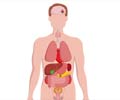A gene mutation has found to influence food preference and could make the individual eat more fatty food.
Highlights
- People with a mutation in the gene Melanocortin-4 receptor (MCR4) tend to eat more fat, according to a study by researchers from The University of Cambridge.
- The satiety signals are improperly processed for such individuals.
- Three chicken curries that looked the same but with varying level of fat were given to the study participants. Participants with the mutation in the gene tended to eat more servings of the high-fat version of the curry.
Chicken Korma Buffet Study
Fifty-four people were included in the study, out of which 20 participants were lean, 20 obese and 14 obese with a mutation in the MCR4 gene. They were given three versions of chicken korma with varying levels of fat- 20%, 40% and 60% but they all looked the same. The study participants were initially given a serving each of the three chicken kormas and then were free to take more servings of whichever version of the dish they wanted.
The study extended to desserts too, where three versions of the dessert Eton mess was served, with 8%, 24% and 54% of energy content. The dessert was made using strawberries, meringue and whipped cream.
Results of the Study
- The study participants were found to eat the same amount of food.
- People with MCR4 gene mutation ate 95% more of the fat version of the chicken korma than lean participants.
- People with MCR4 gene mutation ate 64% more of the fat version of the chicken korma than obese participants who did not have the gene mutation.
- The lean and obese participants ate more dessert than obese participants with MCR4 gene mutation.
- Obese people with MCR4 gene mutation ate less of all three versions of the dessert.
References:
- Gene for high-fat food preference found - (http://www.bionews.org.uk/page_711240.asp)
















